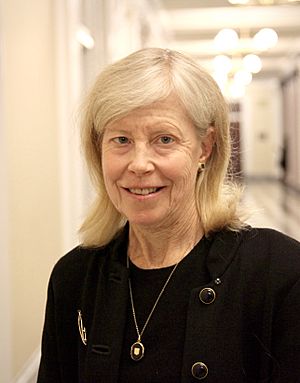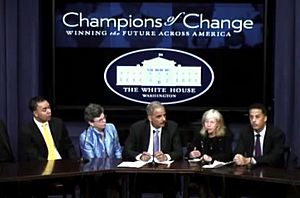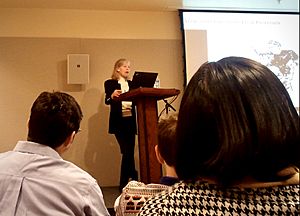Deborah Rhode facts for kids
Quick facts for kids
Deborah Rhode
|
|
|---|---|

Rhode in 2011
|
|
| Born | January 29, 1952 Evanston, Illinois, U.S.
|
| Died | January 8, 2021 (aged 68) |
| Academic background | |
| Alma mater | Yale Law School |
| Academic work | |
| Institutions | Stanford Law School |
| Main interests | Legal ethics, gender and the law, leadership and lawyering |
| Notable works | Access to Justice In the Interests of Justice Justice and Gender Pro Bono in Principle and in Practice The Beauty Bias The Difference "Difference" Makes |
| Notable ideas | "The 'No-Problem' Problem" |
Deborah Lynn Rhode (January 29, 1952 – January 8, 2021) was an American jurist, which means she was an expert in law. She was a professor at Stanford Law School. She was also the most often quoted expert in the country on how lawyers should act ethically.
From her early days at Yale Law School, Deborah Rhode focused on unfairness in the legal world. She worked to find and fix these problems. She started and led several research centers at Stanford University. These centers focused on topics like law, ethics, and social fairness. She also led the Michelle R. Clayman Institute for Gender Research at Stanford. She created the phrase "The 'No-Problem' Problem".
Deborah Rhode wrote 30 books. Her books covered topics like legal ethics, gender equality, and leadership for lawyers. Some of her important books include In the Interest of Justice, Justice and Gender, and The Beauty Bias. She was chosen to be part of the American Academy of Arts and Sciences. She also received many awards from the American Bar Association. The White House even honored her as a "Champion of Change" for her work.
Contents
Early Life and Education
Deborah Lynn Rhode was born on January 29, 1952, in Evanston, Illinois. She grew up in nearby towns, Wilmette and Kenilworth. In the late 1960s, while at New Trier High School, she was a top debater. She even competed against Merrick Garland, who later became a Supreme Court nominee.
In 1970, she started at Yale University. She was in the second group of women ever admitted there. At first, she wanted to help people living in poverty. She wasn't interested in feminism. But a teacher gave her books by Simone de Beauvoir. These books changed how Deborah saw the world. She noticed how women were sometimes seen as an "unwanted minority." For example, university leaders described the new students as "a thousand male leaders and 250 women."
Deborah became a member of Phi Beta Kappa, an honor society. She also joined the Yale Debate Association team. She became its first female president. Before her, famous people like William F. Buckley Jr. and John Kerry held this role. She earned her bachelor's degree in political science in 1974. She graduated with very high honors.
Law School and Early Legal Work
After college, Deborah went to Yale Law School. She worked in the law school's legal clinic. She said seeing unfairness there made her "angry all the time." She and other students wrote a guide for people who couldn't afford lawyers for simple divorces. This made the local lawyers' group upset. But it also made her realize she wanted to teach law, not just practice it.
Her first academic paper was about this issue. She wrote it with Ralph Cavanagh, who later became her husband. They found that people getting simple divorces did just as well with advice from law students as from experienced lawyers. Deborah became an editor for the Yale Law Journal. She also directed the moot court board, which helps students practice legal arguments. She earned her law degree from Yale Law School in 1977.
After law school, Deborah worked for two important judges. First, she worked for Judge Murray Gurfein from 1977 to 1978. Then, she worked for U.S. Supreme Court Justice Thurgood Marshall from 1978 to 1979. During this time, she became friends with Merrick Garland, who was also working for a Supreme Court Justice.
A Career in Law and Teaching
In 1979, Deborah Rhode joined the faculty at Stanford Law School. She was an associate professor. She was only the third woman to teach there. She became the second woman to earn tenure at Stanford Law School in 1984. Tenure means she had a permanent teaching position.
At Stanford, most of the teachers were men. This inspired Deborah to teach the law school's first class on gender and the law. She was also the first to teach a course on leadership for lawyers. She believed many lawyers ended up in powerful political jobs without learning how to be good leaders.
From 1983 to 1989, Deborah was part of the Yale Corporation. This is the group that governs Yale University. She found that gender issues she had seen earlier were still present. She tried to get Simone de Beauvoir an honorary degree from Yale. But the mostly male group resisted. They even questioned if de Beauvoir had written her own work.
Deborah Rhode was a leader in many legal groups. She was president of the Association of American Law Schools. She also founded the International Association of Legal Ethics. She chaired the American Bar Association's Commission on Women in the Profession. She started and led several research centers at Stanford. These included the Center on Ethics and the Center on the Legal Profession. She also directed Stanford’s Michelle R. Clayman Institute for Gender Research.
During the Clinton administration, Deborah advised members of the U.S. House Committee on the Judiciary. She helped them with questions about presidential impeachment. Later, she was vice chair of the board for Legal Momentum. This group works for women's rights. She also wrote a column for The National Law Journal.

Deborah Rhode received many awards for her work. These included awards from the American Bar Association for her scholarship and public service. In 2011, the White House gave her the Champion of Change Award. This was for her work to make justice available to everyone.
Her research also focused on gender equality. She argued that expecting women to wear makeup at work was a form of "gender subordination." This means it put women in a lower position. In 1991, she created the term "The 'No-Problem' Problem." She used this to describe how hard it was to fight for women's rights. This was because many people felt there wasn't a problem to solve.
Deborah Rhode was chosen as a fellow of the American Academy of Arts and Sciences. Studies in 2007 and 2015 showed she was the most quoted legal expert in legal ethics. She was also the third most quoted female legal expert overall. A 2012 study named her one of the 50 most important law professors in the United States.
Her Books and Ideas
Deborah Rhode wrote 30 books. They covered many topics about gender, law, and how lawyers work.
Her 1989 book, Justice and Gender: Sex Discrimination and the Law, showed how much discrimination had happened over 200 years. She often returned to this topic. She explored why discrimination continued and how to change it. In her 1997 book, Speaking of Sex: The Denial of Gender Inequality, she discussed how women's progress made it harder to talk about the unfairness that still existed. She believed recognizing the gender gap was key to making more progress. A reviewer from New York Times called the book "carefully researched, balanced, sobering and sober."
One of Deborah's unique ideas was that discrimination based on how someone looks should be against the law. She wrote about this in her 2010 book, The Beauty Bias: The Injustice of Appearance in Life and Law.
Many of her books looked at how lawyers work. She offered ideas for change. In 2000, she published In the Interests of Justice: Reforming the Legal Profession. In this book, she worried that the legal profession wasn't fair to the public. She felt it didn't do enough for society. She also thought the profession wasn't diverse enough. She believed it needed big changes.
People also praised Deborah Rhode's writing style. A review of her 2013 book, Lawyers as Leaders, said she made complex ideas clear. The reviewer noted that she used "telling examples or memorable quotations" from people like P.G. Wodehouse to Justice Thurgood Marshall. This book came from a course she taught.
Personal Life
In 1976, Deborah Rhode married Ralph Cavanagh. He was a senior attorney for the Natural Resources Defense Council. They had gone to college and law school together.
She enjoyed photography as a hobby. She even convinced Justice Thurgood Marshall to let her take his picture.
Deborah Rhode passed away at her home on January 8, 2021. She was almost 69 years old.
Selected Publications
Books
- Justice and Gender (1989)
- Speaking of Sex (1997)
- Professional Responsibility: Ethics by the Pervasive Method (1998)
- In the Interests of Justice (2000)
- Access to Justice (2004)
- Pro Bono in Principle and in Practice: Public Service and the Profession (2005)
- Moral Leadership: The Theory and Practice of Power, Judgment, and Policy (2006)
- In Pursuit of Knowledge: Scholars, Status, and Academic Culture (2006)
- Gender Law and Policy (2010)
- The Beauty Bias: The Injustice of Appearance in Life and Law (2010)
- Lawyers as Leaders (2013)
- What Women Want: An Agenda for the Women's Movement (2014)
- The Trouble with Lawyers (2015)
Journal articles
- "Why the ABA Bothers: A Functional Perspective on Professional Codes" (1981)
- "Policing the Professional Monopoly: A Constitutional and Empirical Analysis of Unauthorized Practice Prohibitions" (1981)
- "Class Conflicts in Class Actions" (1982)
- "Moral Character as a Professional Credential" (1985)
- "Ethical Perspectives on Legal Practice" (1985)
- "Feminist Critical Theories" (1990)
- "The "No-Problem" Problem: Feminist Challenges and Cultural Change" (1991)
- "Enough said" (1991)
- "Access to Justice" (2001)
- "Public Interest Litigation: Insights from Theory and Practice" (2009)
- "Managing pro bono: doing well by doing better" (2010)
- "Prejudiced toward pretty" (2010)


